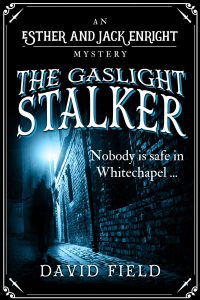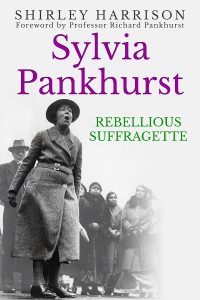Hi Michael! Welcome to the Sapere Books blog!
We are very excited to be publishing your HUNTER KERR detective series. Could you tell us a bit about what first got you into writing?
I started at about the age of twelve, and it was a science fiction apocalyptic story, written in two exercise books from Woolworths. I had an uncle, who was not only an avid reader but had a wonderful imagination, and as a teenager, I would spend many autumn and winter nights with him developing characters and drafting first chapters in front of a glowing coal fire with just a single table lamp burning. It made for a wonderful atmosphere and it was my uncle who introduced me to crime fiction.
Where and how do you like to write?
I have a study set out with everything I need. I start my day walking my dog on fields at the back of my home, and as I’m walking, I am working through what I will be writing when I return. I then hammer away at my keyboard for about five hours, doing some refining along the way, and then take my dog out for his second walk, reflect on the piece I have just written and do a mental edit. I’ll then return and make a few adjustments.
What part of the writing process do you find most difficult?
I am a constructive plotter, and so work out a beginning and end, and build in significant events in the middle, to drive the story. In my study I have a huge whiteboard, and I ‘run’ my stories as if they were a major incident (from my detective days), with photographs, timelines, and spider lines connecting characters to story, so I can keep track.
How much research do you normally do before you start writing?
Not a great deal. Because my crime novels are based very much on my previous career as a detective, I am drawing on those experiences.
How real do your characters become?
Many of my characters are based on people I know or have met, so it’s quite easy for them to own their story.
Do you ever feel guilty about killing off your characters?
Not the villains. As I have said above, they are generally based on the villains I have come across during my career and so I find bumping them off quite cathartic. However, I have just killed off one of my leading detectives in my Hunter Kerr series and I had a great deal of angst about doing so.
What are you working on at the moment? 
I am working on a new character who is a forensic psychologist in a psychological thriller, which is a huge shift for me as my previous novels are police procedurals.
What is your favourite book?
I am such an avid reader I don’t have a favourite book or character. However, there are a few recent reads that stand out among others, and they are: Into the Darkest Corner by Elizabeth Haynes; The Dry by Jane Harper; Her Every Fear by Peter Swanson; Fall from Grace by Tim Weaver, plus The Bone Field by Simon Kernick.
Which book do you wish you had written?
The Bone Collector by Jeffery Deaver – I love the unique element of a paraplegic crime scene examiner detecting a crime from his bed.
Tell us something surprising about you!
I am also an established artist. I have exhibited in London’s Mall Gallery with The Society of Marine Artists, The Society of Oil Painters and the British Federation of Artists. In 2009 I was awarded the SAA Professional Artist of the Year.
Michael Fowler is the author of the DS HUNTER KERR INVESTIGATIONS series.
Click here to order HEART OF THE DEMON – the first book in the series – now!
COLD DEATH – the second book in the series – is available to pre-order.
Happy new year to all of our wonderful authors and readers, and thank you for your continued faith and support! 2019 saw us expand our list with some incredible titles and we can’t wait to share more with you this year.
Here’s what to expect from 2020:
We will soon launch our non-fiction list, led by Sapere co-founder Richard Simpson. Richard is on the lookout for military history titles – backlist in particular – and aims to launch the first few books on our second anniversary in March.
Our ‘call for nautical fiction’ has been successful and we will soon be releasing Irving A. Greenfield’s Depth Force series – thrilling submarine adventures set in the 90s, as well as the first in a series of Second World War naval thrillers by Justin Fox, and a trilogy of Tudor nautical adventure books by David Field.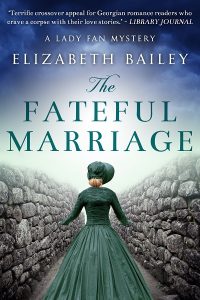
We also have plenty of exciting new projects from our current authors, so look out for the next books in the series you already love! These include the final instalment of Alexandra Walsh’s Marquess House Trilogy; the next ghostly adventure in Linda Stratmann’s Mina Scarletti series; a new Lady Fan regency mystery from Elizabeth Bailey and a return of Charles Dickens as private investigator in J C Briggs’ Victorian series.
We also have brand new authors launching next year and plenty more fan favourites! Make sure you sign up to our newsletter to stay up to date with our latest releases and monthly deals.
Hi Keith. Welcome to the Sapere Books blog!
Can you tell us a little bit about what first inspired you to write the Torquil McKinnon Investigations?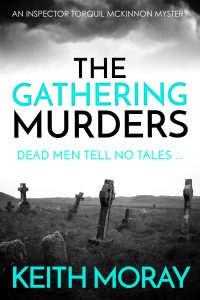
Well, I have been a crime fiction reader most of my life and always wanted to be a crime writer. I began writing children’s stories for The People’s Friend when I was a medical student at the University of Dundee. Then when I qualified, I wrote for the Kingston-upon-Hull’s dial-a-bedtime story service, until I had to give it up and focus on my medical practice. One of my forebears was a piper, and I thought that if I ever did write a crime novel it would have a piper in it. The germ of an idea was there.
A few years later I started having bagpipe lessons from a good friend and golf partner, who happened to be a retired pipe major. So, actually playing the pipes seemed to germinate the idea. Then we went on a family holiday to Tobermory in Mull and the whole thing seemed to unfold before me. A remote Outer Hebridean island with a primitive golf course and the smallest police force in the country, the Hebridean Constabulary. The ingredients were there, it just took a visit to a Highland Gathering on the mainland and I started to plot The Gathering Murders. The characters grew on me and the series just developed.
What was your reason for creating the fictional island of West Uist instead of choosing a real Scottish location?
I suppose I just fell into it. I had written several westerns long before I ever went to the USA, so I just started writing, amalgamating my own memories into my own wee island in much the same way that I had created towns and counties in the Southwest of America. I wanted West Uist to be Scotland in miniature. This is why the terrain varies, there is a great variety of surnames (far greater than in the Outer Hebrides) and I have introduced a different theme with each novel.
What are your typical writing habits? Do you work on a set schedule each day? Do you plan thoroughly before you begin writing?
 I am an opportunistic writer, so I write when I have done all of my essential chores for the day, such as looking after my small practice. I am also a medical journalist and have a written a weekly column in the local newspaper for 38 years, so I can identify with Calum Steele, the editor of the West Uist Chronicle. Because I used to write short children’s stories and now write a newspaper column, I tend to write in short segments. It has become part of my writing psyche. This suits my opportunistic method of working.
I am an opportunistic writer, so I write when I have done all of my essential chores for the day, such as looking after my small practice. I am also a medical journalist and have a written a weekly column in the local newspaper for 38 years, so I can identify with Calum Steele, the editor of the West Uist Chronicle. Because I used to write short children’s stories and now write a newspaper column, I tend to write in short segments. It has become part of my writing psyche. This suits my opportunistic method of working.
I carry a notebook everywhere and am forever jotting snippets down, to be incorporated later. I plot late at night in longhand. When I am actually writing then it will be on the computer, and that can be literally any part of the day.
I do plan it out and have never felt brave enough to just type and see where the story goes. I have a method of writing a novel that seems to work for me. A crime novel has so many elements to it: main plot, subplots, clues and red herrings. I work out each chapter and have a fair idea of what has to happen in each one.
What part of the writing process do you find most difficult?
Plotting is never easy. I go around asking myself ‘what if?’ That’s why I need my notebook handy. I would say it is 80 per cent of the work in writing the novel.
When I am working on the plot, I often play the pipes like Torquil (except he is a virtuoso and I am so abysmal that I am forbidden from playing if there is anyone else in the house). And I also putt golf balls across the landing into my study or chip balls onto the settee. Strangely enough, it facilitates ideas.
In terms of the visceral structure of the novel when I actually write, the middle part is the hardest for me. The first part is scene setting, putting people in the right places and ensuring that the crime happens early on. The middle part is about planting the clues, the red herrings and keeping the subplots going without letting them take over. The end part I already know what should happen, so the middle is about ensuring that you have put everything in place so that you can build it up for the final denouement.
Do you always know ‘who done it’ before you start drafting each novel?
Yes, in virtually all of my books I know who, where, when and how. But, I have to admit that I have on one occasion changed my mind while well into the story. It seemed to work, but I’m saying no more!
The sixth book in the series is due out soon – will that be the end for Torquil, or do you have ideas for more mysteries?
Gosh, I am honestly not sure. I would like to think there will be more, but I am working on other projects at the moment, which I am excited about. Torquil may not have finished with me yet.
And finally – tell us something surprising about yourself!
One of my hobbies is conjuring and I am a paid up member of the International Brotherhood of Magicians.
Click here for more information on Keith Moray’s Torquil McKinnon Investigations series.
THE DEADLY STILL, book five in the series, is available to preorder now.
David Field is the author of The Tudor Saga Series. The Queen In Waiting is the fifth book in the series.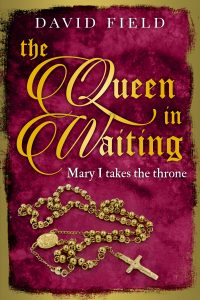
There were many victims during that turbulent period in English history that we call the Tudor era, and not all of them were obvious. ‘Popular’ history has a habit of creating fixed mental images of those who lived their lives in the maelstrom of Tudor Court politics, and it’s only when you examine the actual facts that the doubts begin to creep in. A prime example of a Tudor ‘identity’ whose place in the ‘fake news’ of the period has set her character in concrete is Mary Tudor, the only child of Henry VIII and his first – and longest lasting – Queen, Katherine of Aragon. Mention Mary and the word ‘Bloody’ appears like magic before her name, conjured up by usage and with little regard to the circumstances that led her to burn Protestants at the stake.
Mary was born in February 1516, the only surviving child from her mother Katherine’s long and miserable litany of stillbirths and miscarriages. Katherine may well have suffered from gynaecological problems that Mary inherited, because Mary is recorded as having endured menstrual disorders as a young woman. These were no doubt the early warnings of the phantom pregnancies and uterine blockages that would deny her issue of her own, and lead ultimately to her death.
But in her very early years we are given a picture of a rosy-cheeked, chuckling little infant with her father’s distinctive red hair being bounced gleefully on Henry’s knee as he resolutely hid from the world his inner torment that Mary was not a boy. His obsession with begetting a male heir, more perhaps than any natural lust for Anne Boleyn, led to Katherine’s eclipse, and as she entered puberty Mary was forced to watch from very distant sidelines as her beloved mother suffered the public humiliation of the annulment of her marriage to Henry, and her replacement on the throne by ‘the night crow’ Anne Boleyn. Anne completed the insult by giving birth, in almost indecent haste, to Mary’s half-sister Elizabeth.

Mary Tudor
Humiliation was piled on humiliation as Mary was declared a bastard, and her place in the succession was taken by Elizabeth. The newly demoted ‘Lady Mary’ was stripped of her own former household and sent to live with Elizabeth in Hatfield House, Hertfordshire, denied access to her mother Katherine, who pined her way to a heartbroken death in a remote castle in Cambridgeshire. Mary was reported to have been ‘inconsolable’ at her mother’s death, and suffered from unspecified illnesses for several years during which she was estranged from her father.
The execution of Anne Boleyn and the bastardisation of Elizabeth would have been of little comfort to Mary once Henry’s new wife Jane Seymour gave birth to the heir apparent Edward, who, under the baleful influence of the Seymours who governed the nation as part of his Regency Council, proved to be far more aggressively Protestant than his late father, while Mary was equally determined to both pursue and promote the Catholic religion of her late mother. The two never saw eye to eye, and during a disastrous attempt at reconciliation during the Christmas of 1550, the thirty-four year old Mary was reduced to tears when rebuked by her thirteen year old half-brother, in front of the entire Court, for her fervent adherence to her faith.
The death of Edward was probably the greatest catalyst for Mary’s subsequent actions. It was learned that in his fear that England would slide back into Catholicism should Mary become Queen, Edward had bequeathed the throne to their distant cousin Jane Grey, from an obscure Leicestershire offshoot of the wider Tudor family. Not only that, but the Council of State initially supported Jane, and Mary was obliged to claim her throne by superior force of arms.
She was now 37, beyond the customary ‘sell by’ date of Tudor women, unmarried, childless, and suffering from gynaecological issues. She was probably both flattered and relieved to receive an offer of marriage from her second cousin Philip of Spain. There seems to be little doubt that for him it was a marriage of greed, furthering his ambition to rule most of Europe, but for Mary it seems to have been a love match. Then history repeated itself through a phantom pregnancy and a terrible slow decline with what may well have been ovarian cancer. One can only feel desperately sorry for the lonely old woman on her death bed when one reads that, on learning of Mary’s demise, Philip wrote to his sister that “I felt a reasonable regret for her death.”
Is it surprising that Mary Tudor was hardly a bundle of laughs during her lifetime? Her mother was publicly humiliated, she herself was bastardised by her loving father, her half brother ridiculed her faith, her Council of State preferred a country girl over her as Queen, and her younger sister was prettier, more socially accomplished, and more loved by the people, while her husband regarded sexual relations between them as some sort of public duty. Add to that her almost permanent ill-health, and it is difficult not to reach behind the public persona she left behind in order to give her a consoling cuddle.
In the latest novel in my Tudor series, The Queen in Waiting, I chose to depict the reign of Mary through the eyes of Elizabeth, another victim of their times. I could only describe the events of Elizabeth’s life through the actions of Mary, and they were harsh when considered without regard to the events that forged them. Sinned against or sinning? Your choice.
Order THE QUEEN IN WAITING here.
Or find out more about The Tudor Saga Series here.
Image credit: Portrait of Mary I of England and Ireland by Hans Eworth. (Public domain).
Simon Michael is the author of the Charles Holborne Legal Thrillers, set in the 1960s. The Waxwork Corpse is Book Five in the series.
Like all the books in the series, The Waxwork Corpse is based on real events and real cases but this one you may remember, because it made the headlines.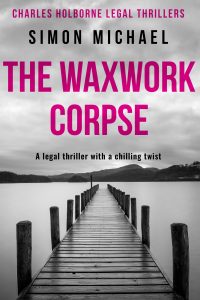
In 1984 a man was arrested in connection with the death of his wife, a body having been found in Wastwater, the deepest lake in England, almost a decade after she went missing, supposedly with her lover.
I learned of the case while waiting in a barristers’ robing room for a jury to return with a verdict. How the killer had dropped the body tied to a kerbstone, in the middle of the night, from an inflatable dinghy into the dark waters of Wastwater. How it had, in a one in a million mischance, landed on the ledge of an underwater pinnacle named Tiffin’s Rock. How, in another extraordinary twist of fate, the ledge was at the perfect depth for the water temperature to preserve the body (the tissues had become “adipose”, wax-like, and so remained recognisable so many years later). And how, extraordinarily, the police happened to be looking for a missing young woman in the same area shortly after an amateur diver first saw the body underwater.
It would, I knew, make a wonderful story, and some years later, following the killer’s conviction for manslaughter and his discharge from prison, I got in touch with his solicitors. Did they think the man would allow me to interview him with a view to writing the story, I asked? They replied in the affirmative and, to my complete astonishment, sent me the case papers, witness statements, photographs, pathology and scientific reports — the complete file.
By then the man was out of prison, running a small B&B in a remote part of England. I got in touch and asked if I could come to interview him, and he agreed. Perhaps rather thoughtlessly in retrospect, I decided that the trip offered the perfect opportunity to take my wife and new-born daughter for a short break away from London.
The plan was to drive from London on Friday afternoon and spend the weekend at the B&B. My wife could walk on the beach while I conducted the interview. However, what nobody predicted, including The Met Office, was that one of the worst storms of the century was due to strike Britain that day.
By dusk, tall vehicles on the motorway in front of us were blowing over. Power lines were brought down by uprooted trees, huge swathes of the countryside were plunged into complete darkness as the electricity supply failed and torrential rain was hurled from the skies. Traffic was guided off the motorway and down narrow country lanes, at one point even being directed over waterlogged fields.
We finally arrived at our destination, a small seaside town, several hours late and in pitch darkness. It was still pouring, the fierce winds howling through the deserted streets and whipping the rain almost horizontal. There was no electricity; even the traffic lights were out.
Eventually, we found the address. We climbed out of the car and, immediately drenched, stepped over dislodged branches and other detritus and ran up the path to the front door. We were exhausted and irritable, with a baby who’d been inconsolable for hours.
I knocked on what we hoped was our host’s front door. At first there was no answer, but then a flickering light swayed down the hallway towards the door. A huge shadow darkened the glass, and the door was opened by an extremely tall man holding a storm lantern.
It was a scene straight out of a horror movie. He offered us hot drinks but my wife, completely spooked by then, insisted we went straight to bed. We climbed the narrow stairs, tired and famished, and entered our dark bedroom. My wife barred the door with a chair.
The next day, the weather was improved and the power restored. I asked my questions about the case and the evidence and the killer’s motivation, while my wife took the baby for a walk on the beach. The interview went well, and it was agreed that I could use the story as long as the man’s identity was obscured to protect his children.
Halfway through I realised that the man sitting opposite me was admitting, completely calmly, that he killed his wife in a fit of uncontrolled anger.
That afternoon I reported some of what I was told to my wife. As I repeated the story and saw the growing horror on her face, it dawned on me that staying for the weekend in an isolated B&B with a man possessing such an uncontrolled temper that he could kill his wife with his bare hands, no longer seemed like such a good idea.
We left that afternoon.
If you want to find out what the killer’s real motivation was, and whether or not he was actually guilty of murder, you’ll have to read The Waxwork Corpse!
Order THE WAXWORK CORPSE here.
Or find out more about the Charles Holborne series here.
Graham Brack is the author of the JOSEF SLONSKÝ INVESTIGATIONS series.
When I started writing the book that became Lying and Dying, I didn’t have a detective in mind. There would have to be one, of course, and because I wanted it to be realistic he would have to be part of a team, but the character of Slonský was not central to my thinking.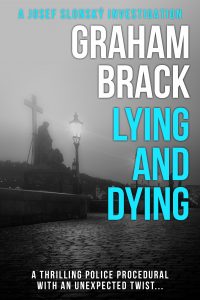
I can remember precisely when he appeared. My brother and I were at the National Theatre; during the interval I described the story, and together we arrived at the notion that a senior Czech detective must have worked under Communism and would therefore probably have some skeletons in his closet. Moreover, everyone he knew would have similar problems, so it would be understandable if he had little or no respect for anyone of his own vintage.
The world-weary detective is a lazy trope, so I made Slonský enthusiastic about his work. He loves his job. He believes it matters, and he has no patience with corrupt colleagues. And then it came to me that the biography I had proposed for him, in which he spent around half his career under Communism, and half after it, meant he must be coming up to retirement. That provided a rich vein of character analysis, because he dreads retirement; there is nothing else in his life, so he wants to go on as long as he can, and the fact that his bosses know that gives them the only hold they have over him.
Thus, Captain Lukas is able to get him to take a trainee officer, Jan Navrátil. Slonský has had partners before, but they quickly apply for transfers. Navrátil can’t do that. He is a fast-tracked police academy officer with a law degree, fierce intelligence, a strict moral code and an open and trusting nature. Slonský comes to realise that Navrátil is incorruptible and probably always will be, and that when he is gone Navrátil has the potential to reach the very top of the tree – provided he listens to Slonský’s sage advice. Shaping Navrátil’s police career will give Slonský the nearest thing he can have to a legacy. Later they are joined by a woman officer, Kristýna Peiperová, who doesn’t have a law degree but balances that by knowing much more about how the world works. Slonský enjoys training her too, and he honestly does not know which of them will get the top job first, but he doesn’t care. Male or female doesn’t matter; all he wants is someone who can bring about the clean, efficient police force he wanted to join.
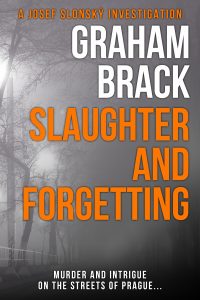 I sat down to write one Saturday morning, and after a page or so the police car pulled up and Slonský climbed out. Battered, inelegant, disinclined to waste any effort, cunning, cynical and sharp-tongued, he appeared in my mind’s eye and somehow took over. A story in which he was a necessary figure but not the star was seized and made into a section of his biography. Whenever he walked into a scene, it livened up, and I found if I just listened to him he told me so much about himself.
I sat down to write one Saturday morning, and after a page or so the police car pulled up and Slonský climbed out. Battered, inelegant, disinclined to waste any effort, cunning, cynical and sharp-tongued, he appeared in my mind’s eye and somehow took over. A story in which he was a necessary figure but not the star was seized and made into a section of his biography. Whenever he walked into a scene, it livened up, and I found if I just listened to him he told me so much about himself.
He doesn’t eat well, but he eats a lot. He is a typical Czech, he believes, devoted to beer and sausages. He lives in a dingy one-room flat, so he spends most evenings in bars. He was married, but his wife left him, and he took it for granted that they were divorced, which proved not to be the case. He believes that nobody can work on an empty stomach, that you should never miss a chance to eat or pee (because you don’t know when the next one will come) and that not everything about the old days was bad.
His name was derived from the Czech word slon, meaning elephant. It seemed appropriate, given his size and his memory, and it was gratifyingly similar to the Czech surname Slánský.
After Lying and Dying was published, a woman wrote to me to say that Slonský was appallingly non-PC in his language but his instincts were good; he was meticulously fair, and therefore free from prejudices such as sexism and racism; and, she said, while she wouldn’t invite him to dinner, if she were ever murdered she would want him to be investigating her death. I think he would allow himself a smile if he heard that.
Click here to order LYING AND DYING now!
We have a range of hair-raising titles to help you get your fear fix this Halloween! Read on to find out more about some of our spookiest stories…
Werewolf is an atmospheric urban thriller set in post-WWII Germany. While running a police training school as part of the government’s denazification policy, Scotland Yard’s Detective Silas Payne is pulled into a grisly mystery. Two corpses are found in a requisitioned house, and another man is soon killed – this time a British soldier. Everyone blames the ‘werewolves’, a dangerous Nazi resistance force. But Silas believes that a new, depraved serial killer might be at large…
 Heart of the Demon, Michael Fowler
Heart of the Demon, Michael Fowler
When Yorkshire is terrorized by a deranged murderer, Detective Sergeant Hunter Kerr steps in to unravel the gruesome plot. A fourteen year-old-girl has been brutally slaughtered, and a bloody playing card has been left beside her body. As his investigation proceeds, Kerr makes another shocking discovery: the mummified remains of a teenage girl, seemingly killed in the same ritualistic fashion. Since the murders were committed more than a decade apart, it seems that the killer is biding their time. And it’s up to Kerr to untangle their deadly game before they strike again…
Mr Scarletti’s Ghost, Linda Stratmann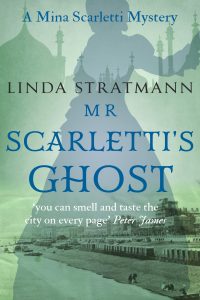
In Victorian Brighton, those desperate to communicate with their lost loved ones are rushing to psychics and mediums. But local author Mina Scarletti is sceptical, believing psychics to be unscrupulous fortune hunters. However, at her mother’s insistence, she takes part in a séance in an attempt to reach her recently deceased father. Still doubtful, Mina decides to investigate the spiritualist – the revered Miss Eustace. But will Mina be able to expose her as a fraudster? Or will Mr Scarletti’s ghost return from the grave…?
In 1963, a boy is abducted and killed in the French countryside. A man is convicted of the murder, but young policeman, Dominic Fornier, is convinced that they have caught the wrong person. In London 30 years later, a boy loses his parents in a car accident and is left in a coma. And when he wakes, he is haunted by strange dreams of a past that isn’t his. When Fornier hears of a possible link between the two boys, he plunges into a desperate race against time to catch a vicious killer and right the wrongs of the past…
On Thursday evening, we attended the Crime Writers’ Association Dagger Awards at the Leonardo Royal Hotel London City – a starry celebration of the best crime writing of the year in the UK.
We are the proud sponsors of the Sapere Books Historical Dagger Award, which recognises the best historical crime novel of the year. From a shortlist of six, the fabulous Destroying Angel by S. G. MacLean was chosen as the winner!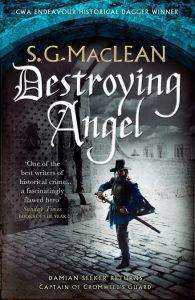
Set in 1655, Destroying Angel is the third novel in MacLean’s popular and critically acclaimed Seeker series. The first book in the series, Seeker, won the Historical Dagger in 2015, so this is a second win for MacLean’s excellent series.
This third book follows Captain Damian Seeker, a trusted member of Oliver Cromwell’s guard, as he travels to the Yorkshire village of Faithly to enforce the government’s anti-Royalist laws. Upon arrival, Damian is invited to dinner at the home of Faithly’s Puritan commissioner, Matthew Pullan – a tension-filled gathering that ends with Pullan’s young ward, Gwendolen, being fatally poisoned.
With suspicion and bitterness rife in the village, Damian must discover whether Gwendolen’s death was an accident or something more sinister. Atmospheric and full of compellingly unsavoury characters, Destroying Angel’s meticulous historical details and intricate narrative keep the reader absorbed throughout.
We would like to congratulate S. G. MacLean on her well-deserved win and applaud all of the shortlistees for their wonderful work!
You can order all the books in S G MacLean’s Seeker series here.
We would also like to say a massive thank you to CWA Chair Linda Stratmann, Vice Chair Jean Briggs and everyone else on the CWA committee who put in some much hard work organising the event! We are very happy to be building an ongoing relationship with the Association and we can’t wait for next year.
We are the proud publishers of both CWA Chair Linda Stratmann and Vice Chair Jean Briggs’ novels.
Click here to find out more about Linda Stratmann’s Mina Scarletti series.
Click here to find out more about Jean Briggs Charles Dickens Investigations series.
Kim Fleet is the author of the Eden Grey Mystery Series, coming soon from Sapere Books.
Hi Kim! Welcome to the Sapere Books Blog!
What first got you into writing?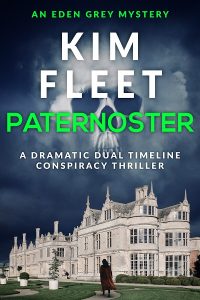
I started writing when I was 9. My dad gave me a book called Write Your Own Novel. It was the first time I’d make the connection that the books I loved reading were written by real people, and I thought I’d like to have a go. Dad also gave me a hardback notebook with beautiful marbled endpapers to write in. I filled it with large, round writing; enormous speech marks; and classic lines of dialogue such as, “Hello, Queen Elizabeth the First, would you like a cup of tea?”
What are your typical writing habits?
All my planning is done longhand. I write out character lists, character portraits, and scene outlines with just enough information to get writing but with enough space for the story to grow on its own. I also draw maps of places and maps of connections between characters: this shows me instantly whether I’ve got enough material for a full novel or if I need to come up with another subplot. It helps to avoid the dreaded soggy bit at 30,000 words in. I do a lot of the planning in cafes as I like the buzz of people around me (and the cake). When it comes to writing, though, I use a laptop and sit up in bed to write with the radio on in the background. It’s terrible for my back but does mean I eat less cake.
What part of the writing process do you find most difficult?
The first three chapters are always a nightmare, mostly because I’m still feeling my way into the novel and don’t know the characters fully yet. Those chapters will be rewritten time and time again. Once I got 30,000 words into a novel, realised I’d got the wrong character as the murderer, and had to scrap the whole thing and start again.
How much research do you do?
Every novel requires some research, whether it’s on places, historical detail, or forensic procedures. Research is so absorbing it’s easy to get lost in it, so I discipline myself to do enough to feel confident to start writing and no more. During the writing process, if I realise I need to research something, I write it on the manuscript and come back to it once I’ve got a complete first draft.
Do you ever find your characters controlling their storylines?
Absolutely. The characters become incredibly real, not only when I’m writing but during ‘normal’ life, too! I often have a voice chuntering in my head as I walk round the supermarket or when I’m gardening. In recent years, in addition to hearing characters I’ve started to be physically touched by them, too. It sounds bonkers, but sometimes when I’m in the car I can feel my character’s knees poking into my back. I think I need to create characters who are a bit shorter.
Do you ever feel guilty about killing off characters?
It’s very hard to kill off some characters, but I think that’s necessary to the story. In crime, there has to be something at stake, an offence against society that we care about and want the sleuth to avenge or solve. If I don’t care who dies, if it doesn’t hurt me while I’m writing, then there’s no power in the set-up and nothing for the sleuth to put right.
Do you find it hard to know when to end a story?
All the time. I either stop too soon or drivel on for too long!
Which book do you wish you had written?
Red Joan by Jennie Rooney. It’s a crackingly good read. It’s the book I always recommend to friends when they say they don’t know what to read next.
Tell us something surprising about you!
I can sing ‘Three Blind Mice’ in the Aboriginal language of Pitjantjatjara.
Paternoster, the first book in the EDEN GREY MYSTERY SERIES is available to pre-order now.
Sapere Books are proud to be sponsoring the Crime Writers’ Association’s Historical Dagger Award, which is for the best historical crime novel set in any period at least 50 years prior to the year in which the prize is presented. Read on to find out more about this year’s stunning shortlist!
Destroying Angel, S. G. MacLean, Quercus Fiction
Set in 1655, Destroying Angel follows Captain Damian Seeker, a trusted member of Oliver Cromwell’s guard who travels to the Yorkshire village of Faithly to enforce the government’s anti-Royalist laws. Upon arrival, Damian is invited to dinner at the home of Faithly’s Puritan commissioner, Matthew Pullan – a tension-filled gathering that ends with Pullan’s young ward, Gwendolen, being fatally poisoned. With suspicion and bitterness rife in the village, Damian must discover whether Gwendolen’s death was an accident or something more sinister. Atmospheric and full of compellingly unsavoury characters, Destroying Angel’s meticulous historical details and intricate narrative keep the reader absorbed throughout.
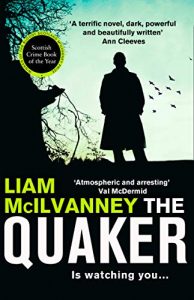 The Quaker, Liam McIlvanney, Harper Fiction
The Quaker, Liam McIlvanney, Harper Fiction
In the midst of a harsh Glasgow winter in 1969, DI Duncan McCormack is searching for a Bible-quoting murderer: the Quaker. The Quaker has already lured and killed three women after meeting them at a popular club – The Barrowland Ballroom – but so far attempts to capture him have been futile. When the body of a fourth woman is suddenly found, McCormack’s resolve stiffens as he plunges into a grim and intense pursuit of the truth. Based on the real-life story of serial killer ‘Bible John’, The Quaker is a darkly convincing portrayal of a city held captive by terror. The novel should also be commended for its effective use of multiple perspectives and skilful twists.
Smoke and Ashes, Abir Mukherjee, Harvill Secker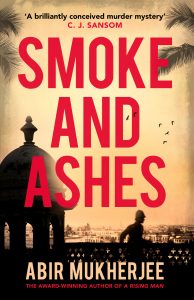
Smoke and Ashes follows Captain Sam Wyndham of the Calcutta police force – a secret opium addict who finds himself trapped in an illegal den during a police raid. As he makes his escape, he comes across a man who has been brutally murdered. And when he later finds a second corpse – apparently killed in the same ritualistic fashion – Sam begins to suspect that the two are linked. Fighting to keep his own vices in check, he teams up with Sergeant Banerjee to investigate the grisly deaths. Evocative and richly detailed, Smoke and Ashes should be praised for its powerful realisation of its setting – India in 1921 – and the strong narrative voice of the embittered, haunted protagonist.
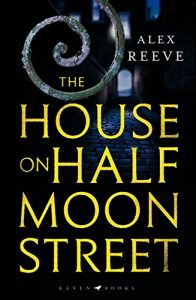 The House on Half Moon Street, Alex Reeve, Raven Books
The House on Half Moon Street, Alex Reeve, Raven Books
Leo Stanhope is a coroner’s assistant with a lifelong secret: he was born Charlotte – the daughter of a countryside reverend – but always knew that he was a man. Having run away to London at the age of fifteen, his dearest wish is to one day make a home with the woman he loves, Maria, and be free to live his truth without fear. But when Maria is murdered, Leo’s hopes are crushed and his freedom threatened. Heartbroken but determined, he vows to find her killer and becomes embroiled in the dark underbelly of the city. With its realistically gloomy Victorian ambience, well-paced plot and thoughtful characterisation, House on Half Moon Street is both gripping and tender.
Tombland, C. J. Sansom, Mantle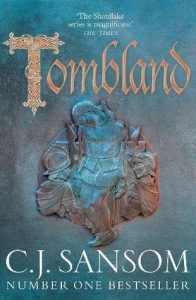
Two years after the death of Henry VIII, lawyer Matthew Shardlake is working for the old king’s daughter, Lady Elizabeth. When Edith Boleyn – the estranged wife of Elizabeth’s distant relation John Boleyn – is found murdered, Shardlake travels to Norwich to investigate. There, against the simmering backdrop of the peasants’ rebellion, Shardlake finds a dangerous, multi-layered plot waiting to be untangled. A sweeping, epic read, Tombland is to be admired for its lively evocation of Tudor England and effortlessly interwoven sense of mystery and unease.
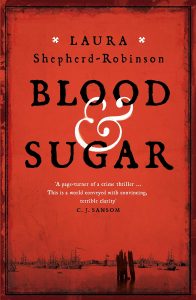 Blood & Sugar, Laura Shepherd-Robinson, Mantle
Blood & Sugar, Laura Shepherd-Robinson, Mantle
In 1781, prospective parliamentarian Captain Harry Corsham returns from the war in the US to find a chilling puzzle awaiting him. A body has been found in Deptford, horrifically murdered and bearing a slaver’s mark. At the same time, Harry’s friend, Tad Archer, has gone missing. An abolitionist, Tad had been gathering shocking information in the hope of bringing an end to the British slaving industry. Determined to find out what happened to Tad, Harry follows the trail of secrets into a web of danger and conspiracy. A thrilling and powerful debut, Blood & Sugar is both an immersive mystery and an unflinching portrayal of the atrocities of the slave trade.
The winner will be announced on the 24th October at the Leonardo Royal Hotel London City. Tickets to the award ceremony are available here.
Patricia Caliskan is the author of two romantic comedies: Awful By Comparison and Girlfriend, Interrupted.
Hi Patricia! Welcome to the Sapere Books blog!
Can you tell us a bit about what first got you into writing?
I wrote stories from about the age of six. I collected stationery, pens and pencils, and spent hours at my miniature desk, making ‘books’ for the family. Beverley Cleary’s Ramona series was a huge inspiration to me as a little girl.
What does your typical ‘writer’s day’ look like?
A typical writing day looks like writing through the night. I’ve always been slightly nocturnal; that’s when I get most of my ideas and can be totally focused. I have a 4 a.m. cut-off and wake up completely zooped to read and edit the work. I have a few places I gravitate towards throughout the house. My latest project is basically happening in the kitchen, so there’s been a lot of snack breaks with this one.
I drink coffee on-tap and usually have a playlist on the go. No rituals as such, but candles signify ‘writing time’. That’s about as ceremonial as I get.
What part of the writing process do you find most difficult?
My challenge seems to be plotting from about three-quarters of the way through to the ending. It’s incredibly exciting to start a project, and I know how each story ends – until I begin writing. The characters and storylines naturally evolve, so my plotlines tend to evolve too. It’s a bit like using Sat Nav. I know my destination, but don’t always take the most straightforward route.
Do you find it hard to know when to end a story?
Absolutely not! There’s nothing like typing ‘The End’ after I’m 100% satisfied I’ve tied up every strand of the story, and done the best work I can for the reader. It’s the best feeling.
How much research do you do?
There’s research involved in every book. Luckily, it’s one of the reasons I enjoy the process. The character of Lara in Awful by Comparison was based on reports ahead of the #metoo movement, and Gia Carangi in particular. The subject of step-parenting in Girlfriend, Interrupted was something I personally experienced, but I visited online forums to make the dynamic as relatable as possible. I’m currently learning about the psychological effects of being widowed, and floristry, so you could say it’s pretty varied.
How real do your characters become and do they ever seem to control their own storyline?
My characters absolutely dictate their fate. Their voices can become very different to how I initially heard them. Listening to certain nuances and spending time with them, they’re full of surprises. It’s kind of like developing a friendship, really. My understanding of them deepens over the course of the novel.
What are you working on at the moment?
I’m currently working on my third novel. It has an ever-changing title, but I can say with certainty that it’s set in the fictitious address of Arkin Avenue, and tells the stories of a great bunch of characters. I hope you’re going to love them.
Which book do you wish you had written?
As she’s fresh in my mind, The Private Lives of Pippa Lee. It was one of those books which made me happy, simply because the character existed. I thought it said a lot about the shifting roles we occupy throughout our lives.
Tell us something surprising about you!
Duran Duran have been my favourite band for nearly 35 years. If you take another look, you’ll find them mentioned in all of my books so far!
On Saturday we had our semi-annual author meet-up in London, where we had a chance to catch up with our wonderful writers over drinks and nibbles, as well as finding out what their next big projects are. Here is a taster of what’s to come:
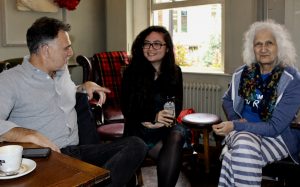
Simon Michael, Natalie Linh Bolderston and Elizabeth Bailey
Elizabeth Bailey has more dazzling Regency romances and murder mysteries in the pipeline with new Brides By Chance and Lady Fan novels coming our way.
Graham Brack has handed in the final instalment of his thrilling Josef Slonský Investigation series, and will be launching a new historical crime series next year.
We are currently working on Jane Cable’s second compelling romance novel, Winter Skies, and she is already drafting her third.
Michael Fowler’s gripping crime thriller series, the DS Hunter Kerr Investigations, is being launched this month.
Anthony Galvin is working on exciting new thrillers under the pen name of Dean Carson, which we will be publishing soon.
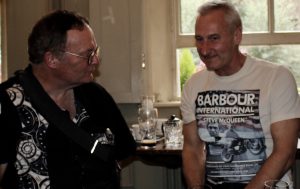
Anthony Galvin and Michael Fowler
Charlie Garratt is drafting book three in his intriguing historical mystery series, the Inspector James Given Investigations.
The captivating fourth instalment of Valerie Holmes’ sweeping Regency adventure series, The Yorkshire Saga, will be coming out soon.
Two members of the Romantic Novelists’ Association, Natalie Kleinmann and Ros Rendle, have recently signed with us and will be bringing out brilliant new books next year.
A brand-new book in Simon Michael’s atmospheric historical crime series, the Charles Holborne Legal Thrillers, is going up on pre-order this month and he has an idea in mind for the next one.
We will soon be publishing book five in Linda Stratmann’s absorbing Victorian detective series, the Mina Scarletti Mysteries, and she has started work on book six.
Deborah Swift’s powerful new wartime romance, The Occupation, will be out by the end of this year.
Thank you to all of the authors who were able to attend, and we hope to see everyone again to celebrate our second anniversary in March!
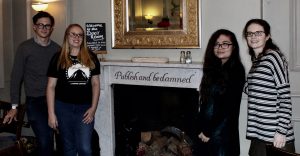
The Sapere Books team
Image credit: a big thank you to Gary Stratmann for his photographs.
Hi Gillian! Welcome to the Sapere Books blog!
The first two books you have published with us have similar themes of children going missing and families struggling to find them. What initially drew you to those sorts of stories?
I set out to write a compelling story (and what is more compelling than the abduction of a child?) that could be seen from several different perspectives. Those of us who are parents can imagine the horror of a missing child, and I was able to draw on my experience of a time when my own two-year-old daughter went missing from our garden. She was only out of my sight for a few moments and fortunately was found within forty minutes, but the gamut of emotions my husband and I experienced was terrifying. The fear, guilt and despair almost crippled us. I was able to project some of these emotions onto the parents in Abduction and Snatched, who had to wait more than an hour to find out what had happened to their missing children.
We will soon be publishing a third thriller by you – THE ACCIDENT. Can you give us a little teaser of what it’s about?
This is a book I consider to be my ‘ripples in a pond’ novel. It begins, as the title suggests, with an accident and follows the consequences for those involved. As the story unfolds, jealousy comes into play with a shocking outcome; a life changing injury is faced, and the very best possible outcome is derived from the very worst scenario. If that isn’t enough, there’s a smattering of romance too!
Have you always wanted to be a writer? What first got you into writing?
It wasn’t until my early fifties that I began writing seriously, although I’ve dabbled in children’s stories and short stories for most of my adult life. Initially, writing was for me a therapeutic experience, as I kept a journal while recovering from a rather difficult period in my life. The first book I ever wrote was a small self-help book, my only foray into nonfiction so far.
What part of the writing process do you find the most challenging?
Probably the ending, as I sometimes get too bogged down in tying up all the loose ends until I’m satisfied that the story is properly wrapped up. Perhaps this is because when I read a book, I find an incomplete ending so frustrating!
Where and how do you write? Do you have set hours or do you write when you feel motivated? And do you have a favourite writing spot?
Being easily distracted, I’m fortunate to have a designated study to lock myself away to write. I try to write most days but often find my mind most active late at night when all these fictional characters keep me awake with their conversations, and I need to write, or at least make notes. As a work in progress develops, the time I spend on it increases as my enthusiasm grows.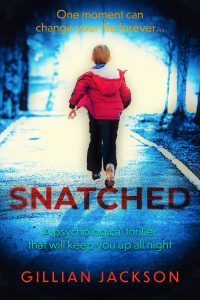
Do you like to read the same types of books you write? Or something completely different? Can you tell us some of your favourite books?
I read quite widely, from thrillers to sagas. I love all of Kate Morton’s books as well as Victoria Hislop’s, particularly The Island. Some of my all-time favourite books are Jane Austen’s novels and the works of the Brontë sisters; I love the sense of atmosphere that leaps off every page, and Austen’s wit is amazing and so timeless!
What three tips would you give to aspiring writers?
You can’t do enough editing and polishing. The temptation when you write those satisfying words ‘the end’ is to get your book out into the world. Don’t – leave it for a couple of weeks and go back to read it again with fresh eyes; you’ll be surprised. Also, write what you know, and enjoy the journey.
Tell us something surprising about yourself!
I used to walk my rather large pet goat, Hobnob, around the streets on a lead. We were discovered and interviewed for BBC TV, but I had to do most of the talking.
Gillian Jackson is the author of psychological and domestic thrillers.
Click here to order ABDUCTION.
Hi Elizabeth! Welcome to the Sapere Books blog!
Elizabeth Bailey is the author of THE LADY FAN MYSTERY SERIES – romantic Regency crime novels, and THE BRIDES BY CHANCE REGENCY ADVENTURE SERIES.
Can you tell us a little a bit about what first got you interested in writing?
I can’t think of a time I didn’t write. I dabbled for most of my young and adult life, but I was in my thirties when I became a member of a co-operative writing group with the idea of sending out each other’s work. I wrote several short stories and then decided to write a historical romance, a genre I had been reading from a child beginning with the novels of Georgette Heyer. That book, though it never saw the light of day, was the turning point. I loved writing it and felt I had at last found my true metier. I’ve been writing fiction ever since.
Do you have set writing times?
Mostly I write my first draft early morning in bed after I’ve had my tea. If I can get between 500 to 1500 words written, I feel I’m making progress. I try to get it all down without research, leaving notes to myself within the text where I need more data. The murder or where it happens, I will usually check out before I start, unless I add something new and have to go and find out about it before I can get on. I can’t start at all until I have names of the main characters and a general idea of what is likely to happen in the first couple of chapters. I actually don’t usually know who the murderer is when I begin. Nothing like making life interesting for yourself!
Seeing as you write historical fiction, do you find you have to do a lot of research?
These days with many years of historicals of the same period behind me I am so familiar with the time that my research is mostly for specifics. I have many books collected over the years which furnish me with the detail I need. My main focus of research is in the area of the murder and the internet is a mine of information on the subject. You can find contemporary sources relating to anatomical matters, which means I can be as accurate as possible according to knowledge of the era. However, I do turn to current material for exact descriptions of what happens, for example, when someone is bludgeoned, knifed or otherwise injured. All of which is fascinating to read about.
What part of the writing process do you find most difficult?
Struggling through against the odds when life intervenes. This happens and you just have to deal with it. It’s virtually impossible in this day and age to shut yourself away in an ivory tower to get your first draft done. I wrote a short book in a week once on a holiday. Another time I forced through 5000 words a day to get a novel done. But it’s not optimum. It doesn’t allow time for the filtering process that builds the minutiae of the story and generates ideas you hadn’t thought of until some trigger sets them off. Working steadily every day seems to build a book better, but it does mean you are subject to interruptions and getting back into it after a break is the hardest thing of all.
Do you find your characters start to control their own storylines?
Yes, they become totally real, and some characters are completely independent and go off in unexpected directions. The thing is, you invest them with life and then they become real people (albeit in a sort of ghost form in your head). They start behaving according to their character and you might have no idea of who they really are until they do this. Ottilia is a case in point. She was supposed to be a retiring female, letting Francis take the lead. Not a bit of it. She marched into centre stage the minute I set her on the page and stayed there. In the book I’m currently writing, I had a peripheral character take off in much the same way and seize quite a chunk of the story from Ottilia. Experience has taught me to run with it. I have a great belief in the Inner Writer knowing a great deal more than I do about the developing story. It really is like being two people sometimes.
Do you ever feel guilty about killing off characters in your crime series?
Apart from the initial dead body, I hesitate. The first death is the spur for the story, so that’s all right. We usually don’t know that person. But it’s very hard to kill off someone who has become a character in their own right. But that’s good, I think. It transfers to my heroine, who is allowed to have an emotional reaction to such a death.
Do you find it hard to know when to end a story?
Usually the story comes to a natural conclusion. Then it’s just a matter of tying up loose ends and giving my lead characters a chance to mull and make decisions of their own. I like to keep the denouement fairly short. When the story is finished, that’s it. And there’s a maxim – always leave the reader wanting more. If you ice the cake too richly, they might be too satisfied to want another slice.
Which book by another author do you wish you had written?
Oh, that’s a tough one. For sheer quality perhaps, another long-time favourite, In This House of Brede by Rumer Godden. So subtle, engaging, insightful and just beautifully written. But then I would love to write like PG Wodehouse whose Jeeves and Bertie books I adore. I’ve had a go in a play I wrote for school when I was teaching drama, and I have a short story out in a similar style (To Catch a Thief). Or Terry Pratchett with such a discerning eye for the human condition.
Tell us something surprising about you!
When I was a teenager, I won two cups for target shooting with a 303 rifle. Now I couldn’t hit a haystack!
We (Amy and Natalie) will be at the 2019 Joan Hessayon Award Presentation, run by the Romantic Novelists’ Association.
The award is for a debut author who has had their book accepted for publication after passing through the Romantic Novelists’ Association New Writers’ Scheme.
This year our editorial director, Amy Durant, served as a judge.
The ceremony takes place on 14th September, and you can find out more here.


When did you first start writing? Did a specific event encourage you to start?
When I was six years old, I saw a TV programme about the Blitz, which as you can imagine was pretty alarming. I wrote a poem about it.
How much research do you do?
I am fascinated with the Victorian era and do a lot of research to try and get the details right. I read contemporary newspapers and journal articles, biographies and medical works. I study maps, census returns, directories, legislation, photographs, and art. I have about a hundred books just on the history of spiritualism.
Tell us about where you write / your writing habits.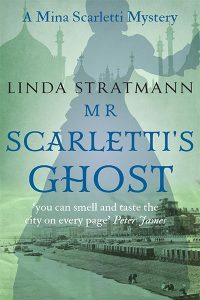
I work from home and have a room which is my office. I don’t work set hours; even when I am doing the household chores, my mind is still working on my latest project or planning a new one.
What part of the writing process do you find most difficult? Starting, knowing when you’ve done enough research, the ending?
When I begin a project, I know where I am starting from and where I will end up, but I have to link the two in a way that makes sense. Every time I pause in order to find that natural link, I have to remind myself that I found it last time. It’s worked so far.
How real do your characters become and do they ever seem to control their own storyline?
They feel very real to me, and because I let themes develop naturally in my mind often the characters do things that I hadn’t necessarily planned but emerge from their personalities and situations, so sometimes they do take me by surprise.
Do you ever feel guilty about killing off characters or do you relish it?
Neither, but it is sometimes sad. It’s very hard writing about a character who I know is about to become a murder victim.
Do you find it hard to know when to end a story?
No, I know when it feels right to me.
What are you working on?
I am editing a new volume in the Notable British Trials series about the trial of the Mannings in 1849. I am also developing the plot for the fifth Mina Scarletti book, to be entitled His Father’s Ghost.
What are you reading right now?
Munich by Robert Harris.
What is your favourite book? Who is your favourite character?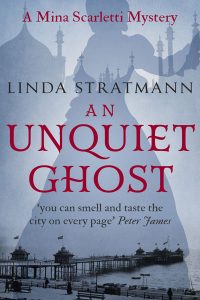
I have read thousands of books and it is impossible to pick one!
What book do you wish you had written?
See above.
Do you love any genres/books that are very different from what you write?
Most of my reading is non-fiction: history, biography, true crime, psychology. In crime fiction, I tend to read books with modern settings or if historical, a very different time period from the one I write about.
Tell us something surprising about you!
I prefer pickles to sweets!
When did you first start writing? Did a specific event encourage you to start?
There has never been a time when I didn’t write. As a child, my idea of a perfect game was to tell a story to my teddies, then write it down. It was never a conscious decision, it was part of me then and it still is now.

How much research do you do?
It entirely depends on the story. For a while I wrote film scripts, mostly comedies, and they didn’t need any research. Likewise my first few attempts at novels (still languishing unpublished!). One story, The Music Makers took all its chapter heading from the wheel of the Major Arcana cards in the Tarot pack. Although I was a fairly proficient Tarot reader back then, I did research other, wider meanings, for the cards to add extra depth to the main character’s adventures.
The Marquess House Trilogy, which has a split timeline comprising of a present day strand and a historical section has taken years of research. Book one: The Catherine Howard Conspiracy was actually not my intended starting place. The big reveal that appears in book two: The Two Elizabeths was the kernel of the idea for this story and, over the years, I have written many different versions of it trying to make it work. However, none of them were quite right and after several years of juggling work, life and researching Elizabethan England I realised the only way I’d be able to capture this monster of a story on paper was to split it into three separate tales, rather than trying to cram it into one book. Three books, one for each piece of jewellery: two ruby rings and a silver locket.
It was actually devastating because it meant starting again from the beginning. In true frustrated writer style, rather than face this unhappy truth, I wrote a comedy instead, entitled The Patron Saint of Married Women, which was set in the present day and needed very little research. In. Your. Face. History.
In the end, I caved in and began researching Henry VIII’s fourth and fifth brides. I also made the alarming decision to dump my two main characters: Isabella and Oliver. I never liked them much anyway. The name Perdita had been running around my head for a while. From reading Dodie Smith’s One Hundred and One Dalmatians when I was younger, I knew it meant Little Lost One and somehow this seemed appropriate for my main character. Then one morning, I woke up with the question: “Who is Piper?” running around my head. Immediately, I knew she was Perdita’s twin sister and something clicked into place.
The very very first version of this story featured Isabella (now gone) mourning her twin sister who had died under mysterious circumstances on an archaeological dig after she had unearthed a silver locket. The idea was that she had been murdered by MI One Elite. Strangely, the nasty old Watchers were there from the beginning, as was Mary Fitzroy, James Rivers and Alistair Mackensie. Jerusalem was always around too, although it took me a while to settle on its true nature. Warren Dexter was another one who survived the character cull. However, it wasn’t until Perdita and Piper popped up that the story suddenly opened up before me. Then, Kit arrived. He had been through a number of names and he finally found an identity because I quite fancied Kit Harington who plays Jon Snow in Game of Thrones. Yes, it’s an embarrassing admission but he was the inspiration for Kit and once he had his name, the last piece of the puzzle was in place and the story flooded out.
I’ve long since moved past my toe-curling crush, though. Ahem.
Anyway, in answer to your question, at present, several months of research and writing of detailed timelines. By gathering all the information into one huge chart, it’s easier to write fluently and present a more rounded and believable version of my historical periods.
Tell us about where you write / your writing habits.
I have a purpose built writing hut in the garden with insulation and a heater. I write every day and, at the moment, am lucky enough to be able to treat it like my day-job.

What part of the writing process do you find most difficult? Starting, knowing when you’ve done enough research, the ending?
It varies. I love the lure of the blank page. Every piece of paper is an adventure waiting to unfold. Knowing when you’ve done enough research is a tricky one but there comes a point where you have to plunge in and see what happens. I don’t like writing endings, not because I don’t like them but because it means you’re saying goodbye to your characters.
How real do your characters become and do they ever seem to control their own storyline?
Very real. They all seem to end up taking over their own storylines. Sometimes, I even argue with them. Although perhaps I shouldn’t have admitted that…
Do you ever feel guilty about killing off characters or do you relish it?
Never! I worry about killing them off for different reasons. What about if I suddenly realise I need them again but they died in Chapter Four?!! EEEKKK!
Do you find it hard to know when to end a story?
Usually I know the end before I begin. The Marquess House trilogy has proved more troublesome though because in my head, it’s one long story, so realising I had to make three endings, instead of just the one at the very very end of book three, has taken a while to adjust to.
What are you working on?
Part three of The Marquess House trilogy. It’s working title was always Prince Oliver but I don’t think this works any more. The title will arrive when its ready.
What are you reading right now?
The Moon Sister by Lucinda Riley. It’s part five of her Seven Sisters series. I only recently discovered these books but I’m really enjoying them.
What is your favourite book? Who is your favourite character?
This is a tough one. How do you choose between so many friends? And also, do I go for something literary and make it look as though I’m very high brow or do I tell the truth?!
For a long time now, my favourite book has been Harry Potter and the Prisoner of Azkaban. I was going through quite a tough time when I began reading these books and, not only was Hogwarts a wonderful place to hide, I was awed by J K Rowling’s brilliance. Goblet of Fire had just been released, the films had been cast and the storm of Harry Potter was building. I never like making judgements on phenomena unless I’ve read/seen/visited them, so I bought the books. Philosopher’s Stone hooked me from page one. Chamber of Secrets worried me – who was Dobby? Was he good or bad? – but when I read the third book with its fabulous twist with Scabbers and the appearance of Sirius Black who had first been mentioned in chapter one of book one, I realised this was more than a series of children’s books. This was truly magical. I’ve asked for help at Hogwarts many times and it’s always been given.
My favourite character is Hermione Granger. Although Harry is pretty amazing too.
I also love Ballet Shoes by Noel Streatfeild and Moll Flanders by Daniel Defoe.
What book do you wish you had written?
Apart for the Harry Potter series? The God of Small Things by Arundhati Roy or The Passion by Jeanette Winterson.
Do you love any genres/books that are very different from what you write?
I try to read a broad cross-section of genres. If a story is well-written, it’ll grip you no matter what the genre. I try never to suffer from literary snobbery. Every book is worth trying, you may not make friends there but you don’t need to be rude!
Tell us something surprising about you!
I play musicals in the background while I write.
When did you first start writing? Did a specific event encourage you to start?
I can’t remember a time when I didn’t write something; poetry as a child, then on to short stories when my children were small, and then novels.
How much research do you do?
It depends. I had to do quite a lot for Dead Ernest as it was set during WW2, but often it’s just my own experience. I did once phone a safari park to find out how a monkey would behave if trapped in a car (for Women Behaving Badly), and they said they had no idea!

Tell us about where you write / your writing habits.
I’m afraid I don’t have any. I’m totally lacking in discipline, and I just write when I feel like it, at a desk in a corner of our bedroom. Not very professional, I’m afraid…
What part of the writing process do you find most difficult?
Starting, knowing when you’ve done enough research, the ending? I think the middle is difficult, but I’m not a planner, so I can get stuck anywhere. I usually just let the story take me where it wants to, and sometimes it doesn’t want to!
How real do your characters become and do they ever seem to control their own storyline?
They become very real, and I really hate letting go of them in the end. They certainly control the story to a great extent, especially when they’re speaking. I love writing dialogue.
Do you ever feel guilty about killing off characters or do you relish it?
A bit of both. But it’s also quite cathartic for me, because I was widowed fairly young, and I use my own experience of bereavement.
Do you find it hard to know when to end a story?
So far, my books have ended more or less of their own accord, but that could change (though I hope not).
What are you working on?
I’ve actually started three, and am waiting for one of them to take off. Two are sequels, and sequels are – I’ve discovered – a lot harder than I thought they’d be

What are you reading right now?
A little-known novel by Anthony Trollope (my favourite author): The Belton Estate.T I’ve read pretty well all his books, several more than once, and was delighted to find this one.
What is your favourite book? Who is your favourite character?
Without doubt, George Elliot’s Middlemarch. And my favourite character has to be Winnie the Pooh.
What book do you wish you had written?
At the moment, it’s Gail Honeyman’s stunning debut Eleanor Oliphant is Completely Fine. Otherwise, pretty well anything by Anne Tyler.
Are you working on a new series set in the Age of Sail? Have you written a naval thriller set during the World Wars? Are you passionate about seafaring stories? Sapere Books wants to hear from you!

We are actively looking to acquire nautical fiction from both debut and established authors. We are particularly interested in historical naval fiction, nautical thrillers, and books in a series.
If you are an author who owns the rights to a previously published naval series, or a writer working on a new nautical novel, please get in touch and tell us about it!
Email our Editorial Director, Amy Durant, directly with some information about your nautical writing and a synopsis of your naval novel and we will get back to you as soon as possible.
We hope to hear from you soon!
When did you first start writing? Did a specific event encourage you to start?
In the 1990s. I can’t be more specific as I went to several creative writing classes, usually with the same tutors. The class would start out well attended, then people gradually would drop out – usually in winter. Then the following year the funding would change and we’d start up again at a different venue. But I always persevered and about three or four of us went to the same classes, which I enjoyed very much. Finally one tutor suggested I sent off some of my stories to a magazine. The first one was rejected but the editor must have seen something in my writing and made some useful suggestions. So luckily my next one was accepted by Ireland’s Own. I still have the cover framed on my wall. It’s dated August 1999 and has the picture of a Connemara pony on the front.
How much research do you do?
For Song of the Shuttle I went to Quarry Bank Mill, a working cotton mill near Manchester owned by the National Trust. The volunteer guide on duty was so helpful, explaining how the machines worked, then demonstrating them. He was really patient answering all my questions. From a large second hand book store in South Manchester I was lucky enough to find a book from the television series about the American Civil War shown back in the 1990s. It was packed with information and original photographs which was invaluable to my research. Other books like ‘The Hungry Mills’ and ‘Reveille in Washington’ helped enormously and also a map showing the major battles of the war.
For subsequent books I’ve turned to Victorian history which has always interested me. The internet is invaluable too. Where else could you discover the uniform that an American military hospital orderly wears?
Tell us about where you write / your writing habits.
I’ve set up office in a small bedroom since my son and daughter have left home. It overlooks the back garden and I can see the small birds bobbing about in the trees. I’m afraid I’m not an organised writer or set time each day for writing. I have a habit of waking up at an unearthly hour with an idea in my head and can’t get back to sleep until I’ve typed it out. I did try to write those ideas down on a pad by the bed but couldn’t read my writing in the morning. So I drag on a hairy old dressing gown – and tracky bottoms in winter – and sneak off into my office for an hour or so. Then I slip back into bed and sleep soundly.
What part of the writing process do you find most difficult? Starting, knowing when you’ve done enough research, the ending?
Most of my stories are written in my head long before they reach the page. Then when I have time I want to get down the information as quickly as possible. Of course I have to go through it all again and edit it. Sometimes I seem to write in Polish! I’m not keen on editing and don’t like rewriting at all.
How real do your characters become and do they ever seem to control their own storyline?
My characters do seem to take on a life of their own and I instinctively know how they will act. This is a very perceptive question as many times my ideas and plots will change when faced with what a character would do.
Do you ever feel guilty about killing off characters or do you relish it?
I have sat and wept when one of my characters died. Normally it’s only the baddies that ‘get it’. I feel they get what they deserve.
What are you reading right now?
At the moment I’m reading a spy novel by John Le Carre and persevering with it. I get annoyed by the macho attitude of the men though! I have Lamentation by C. J. Sansom waiting in the wings. I love his Shardlake novels.
What is your favourite book?
My favourite book is Jane Eyre. I’ve always loved it from being young when I had the Dean and Son version for young readers.
What book do you wish you had written?
Something brilliant like The Book Thief. I’ve recommended it to so many people and they’ve all enjoyed it.
Do you love any genres/books that are very different from what you write?
I have very eclectic taste. I really enjoy Terry Pratchett books. Patrick O’Brian’s seafaring novels are a favourite and also Lyndsay Davies’ Roman detective Falco. Although they are historical novels, they are very different from the romances that I’m writing.
Tell us something surprising about you!
I’ve had a painting exhibited in Manchester Art gallery. I won a competition where all the art classes round the city sent a painting that was inspired by one of the Gallery’s paintings. It was called ‘Things to Do’ and in one corner featured a cosy armchair, a book and a cup of tea. The rest of the canvas had an ironing board, a dirty frying pan, an un-ironed shirt and lots and lots of socks – black with a different coloured heel. None of the socks matched! The blurb was that I’d rather sit reading than doing all the chores. Along with a certificate I received a bag of art goodies. Unfortunately I don’t have time to go to any art classes nowadays.
Chapter One
Sunday, March 28th, 2010
Danny Sanchez arrived at 10:27.
It was already bedlam; hundreds of people covered the dusty patch of waste ground beyond the white walls of the property, shouting, pushing, arguing among the cacti and scruffy palms. The excavator’s arm loomed menacingly above the roof of the two-storey villa.
The demolition had been scheduled for nine a.m., but frantic negotiation had earned the elderly expat owners a three-hour stay of execution while the house was cleared. The whole neighbourhood turned out to help, Briton and Spaniard alike. A stream of people walked back and forth along the edge of the unpaved road, carrying everything and anything they could salvage – doors, windows, even the kitchen work surface. The problem now was where to put it all. An incongruous pile of household items was collecting around the trunk of a fan palm. Danny watched as a negligee blew free from a box and wrapped itself around a cactus.
Christ, what a mess.
In eighteen years of journalism, Danny had witnessed dozens of horrors – people cut from the wreckage of car accidents, a woman leap from a burning building, a suicide on a railway track – but this was something new. They were going to demolish Peggy and Arthur Cookes’ house and nothing could be done to avert it. He’d seen the paperwork. Nearly every penny the poor old duffers had was invested in the villa; a lifetime’s equity would be smashed to rubble. It was like waiting for an execution.
The Junta de Andalucía, southern Spain’s regional government, had sent a woman in her mid-thirties to oversee the demolition. Crafty, Danny thought; people found it harder to get angry with a woman, especially an attractive one. Her hard hat and fluorescent bib bobbed at the centre of a tightly-knit group of people. Guardia Civil officers in green boiler suits formed a protective ring around the Junta woman. Then came the leaders of the protestors, waving documents and trying to argue over the shoulders of the Guardia officers.
Behind them was the press pack, two dozen strong, cameras and microphones waving above the crowd as it surged and rocked. Gawkers and curious children milled at the edges, wondering what all the fuss was about.
For her part, the woman from the Junta looked genuinely distraught at what she had to do. Danny had no idea whether she could follow the English words being bellowed at her, but it was obvious she understood the gist. She kept pointing to the paperwork on her clipboard, raising hands and shoulders in shrugs of helplessness. Someone, somewhere had decreed the demolition must go ahead; it was her job to get it done.
The Cookes were inconsolable. Peggy sat on an armchair that had been dumped among spiky clumps of esparto grass. Tears carved streaks through the dust that had settled on her face. Danny recognized the armchair; he’d sat in it when he’d interviewed them a year before, when the demolition orders were first served. Arthur Cooke had looked dapper and defiant as he posed for the cameras back then; now, every one of his seventy-three years weighed upon him. He stood with his hand on his wife’s shoulder and turned moist eyes as Danny approached.
“Not now, mate,” he said, shaking his head. “The bastards are about to ruin us.”
Danny nodded, glad he’d been spared having to ask the obligatory “How do you feel?” It was amazing how dumb those four words could make you feel sometimes.
Peggy Cooke wanted to speak, though. “Why us?” she said, her voice shrill. “Out of all the hundreds of people, why does it have to be us? I want you to print that. It’s not fair.”
Why us? That had been everyone’s first reaction in March 2009 when the judicial demolition orders were delivered to eleven different families dotted around the municipality of Los Membrillos. It seemed so monstrously unfair, given the scale of the problem in Almeria, the province that occupies Spain’s south-eastern tip. A Junta survey had uncovered more than 12,500 irregular constructions in just ten of the worst affected municipalities. But the Spanish legal system was a Heath-Robinson contraption manned by characters from Kafka; immense and baffling in its complexity, arbitrary in the decisions it dispensed and spitefully prescriptive when it did so. It was one of the dangers of emigrating to Spain, the flipside to all the sunshine, fiestas and good living.
Not that it had worried the tens of thousands of Britons who had flooded the Almanzora Valley at the turn of the century, buying up villas and plots of land for self-builds, breathing life into the moribund rural communities that nestled below the Sierra de los Filabres mountain range. But the rush to expand had left thousands caught in the legal quicksand between the local and regional government of Andalusia. Local councils could grant licences to build, but the regional government had the right to challenge those licences. The catch-22 was that no one would stop you from planning to build a house; the house actually had to be built – and the money spent – for it to come to the Junta’s attention and challenge its legality.
Why us? Danny knew the answer to Peggy Cooke’s question; he’d interviewed the mayor of Los Membrillos. “We had so many applications for building licences, we were swamped,” the mayor had said, unlocking a cabinet and indicating three large cardboard boxes leaking paperwork. We only got round to processing eleven.” That was the bitter irony of it; by trying to follow the rules, these unlucky eleven home owners had created a paper trail that Junta officials could follow back to specific properties.
Time was ticking on. The crowd was getting angrier, the shouting louder. More Guardia officers arrived. Danny phoned everyone and anyone he could think of who was involved with the case.
It was the usual pass-the-parcel.
The council blamed the Junta, the Junta blamed the courts, the courts blamed the council; all down the line, each link of the chain shrugged its shoulders and pointed to someone else. Arthur Cooke watched Danny in action, hoping that this man who spoke such perfect Spanish could somehow work a miracle. Danny finished the phone call, shook his head. The flicker of light in the old man’s eyes dulled.
Paco Pino arrived at 11 a.m., yawning and scratching at his chest. “My one day off,” the photographer said, screwing a lens onto one of three cameras dangling from his neck, “And this has to go and happen. Just my luck.”
Danny was glad the Cookes couldn’t speak Spanish; crass comments like that were the last thing they needed to hear. Not that Paco was a bad person; experience had simply made him blasé, like everyone who made a living reporting other people’s misfortunes. Truth be told, Paco was a saint in comparison with some; Danny had spoken to one of the journalists sent by a UK red top to cover the announcement of the demolition orders the previous year.
“We won’t be interested again now until they knock the things down,” she said as she left, nodding toward the cloudy March sky. “Let’s hope they do it in summer, eh? I might get a bit of a tan.”
The pile around the palm tree grew: beds, sofas, lampshades, mirrors, cardboard boxes stuffed with clothes and crockery. Danny looked at his watch. Not long now.
At ten to twelve, uniformed officers of the Policia Local cleared the last of the protestors from the garden and checked no one was left inside the house. There were more scuffles on the white gravel outside the villa, more insults in English and Spanish. The property’s black gates had been lifted from their hinges earlier to allow the excavator through. Having shoved a final protestor outside, Guardia Civil officers formed a human barrier in the space between the gateposts. Protestors waved paperwork at the Junta woman as she looked at her watch and waved toward the workers.
The sudden roar of the excavator’s engine caused everyone to freeze and fall silent. The crowd turned as the engine revved and the excavator’s mantis arm uncoiled and rose above the house. For a moment, time seemed stilled…
…and then the air thundered as the excavator’s claw drove down through the roof. An angry moan emerged from the crowd as the arm rose and hundreds of dislodged tiles showered and smashed on the ground. The excavator arm dipped once, twice, three times more, prising the roof apart before ripping backwards and pulling free a ragged-edged section of brickwork. Looking through the jagged rent it created was surreal; the neatly-tiled interior walls had been exposed, giving a view inside a giant dolls’ house.
The Cookes stood holding each other: Peggy sobbing; Arthur straining to keep her on her feet, his face stoic. They were tearing his house down, but he wouldn’t show a flicker of weakness. Another huge section of wall tumbled away; it fell to the ground with a thud. Dust rose, people coughed, choked, began walking back along the road. Danny pulled his jacket up to cover his mouth.
The Spanish woman atop the ridge didn’t really care about the foreigners; their house was illegal; it had to come down.
She was only there for the spectacle, to have something to tell her friends tomorrow at the market.
She was the first to see it.
Her mouth gaped; then she began to scream and point toward the corner of the house. People looked to see what the noise was but the sounds were rendered unintelligible by the rumble of falling brickwork and the excavator’s diesel chug.
But the dust was settling now; people were following the woman’s outstretched hand, squinting as they too noticed the thing wedged in the narrow gap between exterior and interior wall.
A Guardia Civil officer rushed to the excavator, banged on the window. The machine fell silent. Other people had noticed the shouting woman now and were pressing closer, shading their eyes, unsure of what they were seeing. For the second time that morning, a sudden silence halted the crowd.
Danny thought it was a mannequin at first. And then the corpse fell forward, bending from the waist, its blackened head rocking back and forth. Some people screamed; others stood open-mouthed; some turned to run.
Arthur Cooke’s face remained expressionless as he stared at the semi-skeletal corpse lolling from the broken wall of his house. Then, without moving a single muscle of his face, he toppled forward and fell heavily to the earth.
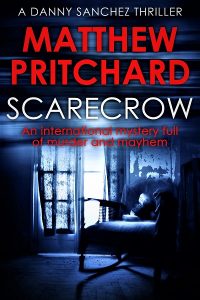
Need to know what happens next? Get Scarecrow now from Amazon.
The Cooper Museum, housed in a small building in the heart of historic downtown Upland, offers a cozy and often crowded venue for local events. A favorite place to hang out with city residents, this cheery place often invites authors whose books feature the history of American towns and people, especially people from Upland, California.
I wrote my first edition of He Wrote Her Every Day in Upland and printed twenty copies in time to celebrate my mother’s 90th birthday. Based on letters Mom had saved from my father in Germany during WWII, the book was my mother’s gift to share with the family. This hard-cover version of their story includes photographs and follows a narrative using all the documents and souvenirs my mother saved. When I received an invitation to present my book on Author’s Day at the Cooper, I was delighted—and a bit apprehensive.
I decided to prepare a visual display of a few of Dad’s letters and many of the souvenirs. Did I mention that Mom saved everything? I needed three tables, but managed to make do with two. A three-foot square map mounted on a display board earned center stage, balanced between my tables. It was also a place I could hide if no one showed any interest in my book.
The map, sent to all the soldiers and their families from the Army post-war, depicts the route this Infantry division traveled from the beginning of the war until the final return of the last Occupation troops. So when the recommissioned Queen Mary finally brought Dad home, Mom already had the map of the route taken by his troops known as the Railsplitters.
Our afternoon of book signing invited walk-through traffic in the patio area outside of the small museum. A beautiful afternoon in California promised our group of about a dozen local authors a busy opportunity to talk to our neighbors about our books. I was hoping for a few sales and a chance to meet my fellow writers.
Flattered when the assistant curator pulled a chair up at my table, I smiled widely as he began to go through all of the V-mails, coins, K-ration kit remnants, and the seventy-five-year-old postcards that make up my father’s collection. He looked through the assemblage of bits and pieces that had been the focus of my writing for about a half hour before, at last, he raised his head and just said, “Wow!”
Hungry for some positive feedback, I answered by asking, “Wow what?”
His response was a surprise. “You should not have all of this sitting out here in the sun for anyone to handle. This should be in a museum.” I thought he was trolling for a donation to the Cooper, but no, he assured me that mother’s bits and pieces needed a place where scholars could read the primary documents and preserve them for posterity.
He told me about the National WWII museum in New Orleans, LA. It took me a year to do it, but Kim Guise, curator of the museum in New Orleans, guided me through the process and helped our family contribute the collection to them. Mom was tickled to sign the donation papers and make it official. The museum staff is currently working on a display of the letters and souvenirs of Private James William Hendrickson, Jr. It is, according to Guise, the largest collection of letters and documents from an individual American soldier.
This was exciting, but the best experience at the Cooper came on yet another day when my display had been transferred from the originals to mere copies. The Railsplitter Map held pride of place and looked as sharp and clear as the originals.
He Wrote Her Every Day will be published by Sapere Books and is coming soon!
The Daily Mail and The Sun are both pretty shitty newspapers, I ought to know: I wrote for them both.
Why? Because they were the only newspapers that paid decent money to journalists working out of Spain.
Anyway, stories that were suitably comic, tragic or grotesque enough for The Mail or The Sun only occurred infrequently on my patch – but when they did, I entered an incredibly stressful, real life version of the cartoon, “Wacky Races”, as the first journalist to get there and get the pictures and facts, got the sale. The rest just wasted time and petrol, and I was always in competition with at least 3 or 4 others.

And it was those missed sales that started chipping away at my integrity. Because if you work for shitty newspapers, you very quickly begin to behave in a shitty way.

With me, it began with a bit of cheeky chicanery. Much of rural Spain consists of unmarked dirt tracks, the names of which are known only to locals, so most reporters rely on rural petrol station attendants for guidance, and I often slipped the staff a tenner to misdirect any other strangers asking around.
Pretty tame stuff, but it was the start of the road to Shitsville. And once you’re on it, the question quickly raises itself: How far down the road are you prepared to go?
I found out in 2010, when I covered a story about the collapse of a house which had killed two expats in a tiny hamlet way up in the mountains.
When I got there, I deployed my usual set of tricks. First of all, in order to find the house, I lied and said I was a friend of the dead couple and was there to pay my respects. This got me detailed directions, as well as plenty of pats on the back and commiseration from local Spaniards. I may even have squeezed out some crocodile tears for their benefit.
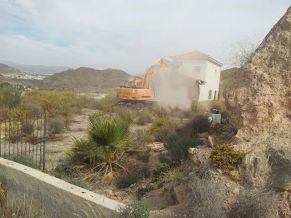
The property was all locked up and wrapped with police incident tape, so I climbed the fence and started looking for a decent angle from which to take a photograph, clambering, hopping and jumping all over the rubble as I did so. When a neighbour of the dead couple emerged and asked me what the hell I was doing, I ignored his question and asked him the only thing that interested me: ‘Have you seen any other reporters here before me?’
When he said, ‘No’, I climbed back over the fence and started looking for somewhere with Wi-Fi coverage.
I got the sale. But as I was celebrating in a local bar, looking through the photos I had taken, I began to notice that there was dried blood and other types of biological matter all over the collapsed concrete pillars and rubble. Then I noticed some of it had stained the tip of my desert boot as I’d been merrily desecrating a place where two people had died a sudden and likely very painful death.

I lay awake that night, and slowly came to the realisation that I did not have what it took to be a fulltime tabloid journalist. My journey along the road to Shitsville had ended.
And that’s where Danny Sanchez was born. Because Danny does have what it takes and I enjoy exploring the grottier side of journalism through the prism of the character.
Most readers warm to Danny immediately, but others don’t, and I suspect it is the ruthless side of Danny’s character that is the reason for this – he climbs walls, he lies, he goes through bins, he enters people’s homes uninvited and he “borrows” documents – in short, he does whatever he has to in order to get the story.
The trick is to make the people he is investigating so loathsome that the reader sympathises with Danny, despite his shady behaviour.
Anyway, for those of you who dislike the character, I’d ask that you cut the guy some slack – he trawls through the shitty side of journalism so I don’t have to.
Sapere Books are publishing books of mine from two different series involving two different detectives.
One, involving Lieutenant Josef Slonský is set in 21st century Prague; the other, featuring the university lecturer Master Mercurius, takes place in 17th century Netherlands. There are obvious differences in setting that inform the writing.
Slonský is a career policeman. He is inclined to take the occasional drink to get the mental cogs turning faster. There is nothing much in his life except his work, and since he is 58 when the series starts, the threat of retirement looms large. Slonský has all the support that modern science can offer, including a mobile telephone, though he does not really know how to do anything beyond making calls on it.
Mercurius is very much an amateur, an accidental detective who falls into the work when a series of abductions in Delft leave the local authorities baffled, so they send to the University at Leiden for a clever man who might help them solve these; and the Rector sends Mercurius. He is a young man, only 33, a lecturer in moral philosopher and an ordained minister, and he has little in the way of science to help him.
To my mind, though, none of these is the major difference between the series. I award that distinction to the fact that Slonský books are written in the third person, whereas Mercurius narrates his; and I thought it might be instructive to discuss why that is so.
I would love to say that it was the result of a carefully balanced decision, weighing all the factors for and against either approach, but if the truth be told the stories just came out that way. In my head, the action in Slonský appears as a film in which I stand back, observe, listen and record, whereas the Mercurius books involve me as a character in the tale I am telling. I toyed with telling Mercurius in the third person, but it didn’t feel right, and I have spent a bit of time thinking why that might be.
I think the reason is that Slonský is a big character, but he has a large regular supporting cast and it is important to me that we should get to know them. If he were also the narrator, I think he would dominate too much. Mercurius, on the other hand, is the only character who appears in all that series of books, and as the only consistent element the story has to pivot on him anyway.
This is not just of analytical interest. Many crime novelists consistently favour one or the other approach. I am prepared for either, but it changes the way the story develops. In Slonský stories things can happen when he isn’t around; Mercurius only knows what he sees and hears. That inevitably leads to a slower unwinding of the evidence, because it would seem forced if all the clues turned up in an afternoon. Slonský can send his colleagues out to investigate several lines of enquiry and bring them back together for a conference; Mercurius spends a lot of time travelling to discover things for himself. There is no telephone or telegraph system that he can use, and he does not possess a horse.
There have been rare examples of writers changing the voice during a series – Conan Doyle had Holmes writing one of his stories, for example – but generally once the choice is made, you’re stuck with it. It seems strange, given how important it is, that I am not more systematic in my selection!
LYING AND DYING, the first thriller in Graham‘s Slonský series, is available to pre-order now.
Full-time employee by day, aspiring novelist by night? Then you’ve come to the right article, my friend! That’s how every author who ever nabbed themselves a publishing deal started out. So, let’s do what all dreamers do, and make a list:

1. Be Prepared.
Dib-dib-dib, as the Boy Scouts say. Be prepared to make your first priority a notepad and a pen. Don’t leave home, work, or bed, without them. Inspiration is all around. That punch-line you blurted out. The way someone pronounces, ‘Yugoslavia’. The colour of Boredom. Get as ephemeral or literal as you like, but write it down. Because you’re a writer, remember? It’s not 9-to-5. It’s stride-in-your-step, adrenelin-jolting devotion!
Between You and Me: Check that notepad is tantalizingly empty, and the pen actually works before you get too attached to a brainwave. Ahem.
2. Time on your Side.
Writers tend to fall into either early-morning or late-night camps. That’s because our brains rather wonderfully surrender all traces of reality when we’re pre- or post-dreaming. Marian Keyes set her alarm a couple hours ahead of the office to complete work on her first novel. Jay McInerney kept cosying up to the keyboard way past the midnight hour. No matter which option hits the mark, make it a date.
Friendly Advice: When circumstances don’t allow, don’t beat yourself up. Keep jotting down ideas as casually as you like, and know you’ll make it up to your manuscript with a ream of words waiting in the wings.
3. Plan, plan, plan!
I’d like to be one of those streamlined, linear-types, writing at stealth from beginning to end, but guess what? It doesn’t happen. I know where I’m going. I’ve a pretty good idea why we’re going there, but midway is about as far as I get, plot-wise. Then it’s time to iron-out the initial plan. If you’re armed with a water-tight synopsis, I look on in awe, but I need to submerge in the writing before emerging with a first draft.
Lesson Learned: If something isn’t working, it’s because it doesn’t work. Move on. Re-think. Re-write. No Re-grets.
4. Prioritise
As nice it would be to flounce off into the nearest vestibule and announce an early retirement from all daily responsibility, it’s first things first. Your mind can’t wander into fiction beneath a cloud of household chores or office deadlines. Pin them down. Get them done. Then consider yourself free to focus.
Working Lunch: Make the most of any break. Walk. Think. Be alone. Listen to your characters. Trust your instincts. Jot those thoughts down in that notepad you carry these days.

5. Bite into the Best Bits
There’s no point setting aside time, staring at a screen, wondering where to find a word count. Sometimes you have to take it by surprise. Don’t think of it as a book. Start with that ending you can’t wait to write, or the big reveal you know has to happen. Hit the highlights. Pick out the praline, and throw away the toffees! Why not? It’s your work. Kill off that character before they’re introduced in chapter eight, you absolute maverick! Look in the rearview, and you’ll find a picnic trail of plot development.
Novel Navigation: Make sure there’s batteries in the torch. In other words, map each scene in a working synopsis as you go along. See that shard of light up ahead? That’s the ending, compadre.

Visit Patricia’s author page or find out more about her second novel, Girlfriend, Interrupted.
Sapere Books is a digital and print-on-demand publisher of exciting new submissions and brilliant backlist books.
We are excited to be launching our first titles on March 1st!
Our launch books include An Unquiet Ghost by Linda Stratmann – the latest novel in her intriguing Mina Scarletti mystery series; The Gaslight Stalker by David Field – a brand new voice in historical crime; Dead Ernest by Frances Garrood – a touching story of love and loss; and The Gathering Murders by Keith Moray – the start of his thrilling Scottish detective series.
Check out our AUTHORS page to see all of the brilliant writers who will be publishing their stories with us in 2018. We have lots of exciting announcements coming soon, including a brand-new series from award-winning Irish author, Cora Harrison, and Regency crime from best-seller Elizabeth Bailey.

